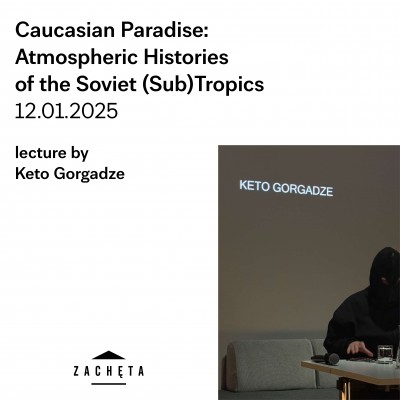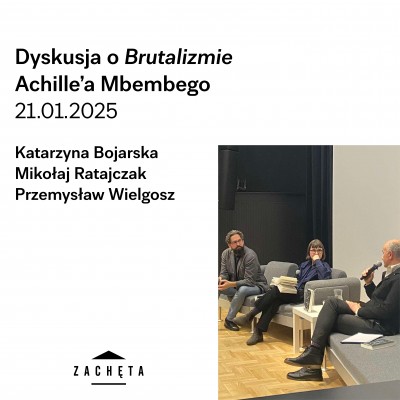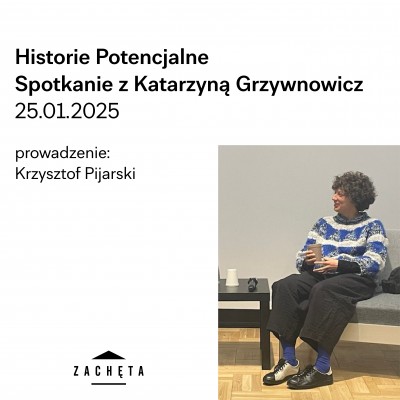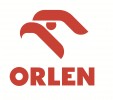POTENTIAL HISTORIES
19.10.2024 – 02.02.2025 POTENTIAL HISTORIES
Zachęta – National Gallery of Art
artist: Basma al-Sharif, Noor Abed, Kader Attia, Ariella Aïsha Azoulay, Anna Boghiguian, Karolina Grzywnowicz, Nikita Kadan, Rabih Mroué, Mykola Ridnyi, Ala Savashevich, Wael Shawky
curators: Maria Brewińska, Joanna Kordjak, Katarzyna Kołodziej-Podsiadło
cooperation: Jess Łukawska
The exhibition’s starting point is the concept of potential history formulated by Ariella Aïsha Azoulay, a scholar of political thought and visual culture, in her book The Potential History: Unlearning Imperialism (2019). The author rejects history as an academic discipline, treating it as a tool of imperial violence and questioning the dominant narratives perpetuated by institutions (borders, nation-states, museums, and archives). Potential history is the reparative tool that she proposes, a strategy for retelling history from a non-Western and decolonial perspective. It reveals the recurring mechanisms of exploitation, but also allows us to address the effects of imperial violence as if it were happening here and now. In practice, the ‘unlearning of imperialism’ called for by Azoulay means writing history based on previously unexplored documents of the past or immaterial sources of knowledge, taking into account the multiplicity of identities and cultures that no longer exist or are currently disintegrating before our eyes. It is therefore a look at the past, but one that is oriented towards the future and the repair of contemporary relations.
The works presented in the exhibition — films, installations and objects created in recent years by several artists — are united by the themes of appropriation, instrumental treatment and the reclaiming of history, presented in the context of current political tensions. These concern regions of recent and ongoing conflict marked by the legacy of colonialism and of Russian imperialism: the Middle East, North Africa, and Eastern Europe.
The mechanisms of manipulating history are revealed through the metaphor of a puppet theatre, which Wael Shawky uses in his film trilogy. In Cabaret Crusades, he reinterprets the history of the Crusades and the clash of two civilisations, based on Arab historical sources. He questions the neutrality of archives and points to the political dimension of telling the past.
Rabih Mroué and Nikita Kadan explore this theme in the context of photographic archives. On the one hand, photography is an important tool for constructing the historiography of the twentieth century; on the other hand, it is particularly susceptible to falsification. In both Mroué’s monumental video installation and Kadan’s drawings, individuals with their personal histories are depicted as pawns in a ruthless political game. Both works address the issue of contemporary memory wars. This theme is also present in Mykola Ridnyi’s latest film, Battle over Mazepa, which the artist contrasts two different narratives of the biography of the Ukrainian national hero. The artist demonstrates that art can be a tool for reclaiming history. In her work, Ala Savashevich confronts the legacy of the Soviet empire. She refers to the destruction of monuments — a symbolic act of overthrowing authority based on various hierarchies.
The appropriation or theft of the history of colonised nations and cultural goods as a tool for building imperial domination is one of the key themes in Kader Attia’s works presented in the exhibition. They resonate with the call for restitution, not only as a practice of returning objects stolen during colonial plunder, but also as a means of restoring dignity to marginalised social groups and their emancipation. In both works, Attia develops a notion of ‘repair’ that is made possible by a shift in perspective and ‘the bringing of history into the present’. Similarly, in her latest film, Azoulay touches on the theme of the looting of cultural goods by European states. Meanwhile, Anna Boghiguian’s works examine the history of the world, especially the socio-economic processes based on slavery and the exploitation of cheap labour that gave rise to great imperial powers.
The experience of displacement and detachment from one’s own culture, but above all from one’s own land, is the starting point for the works of Basma Alsharif and Karolina Grzywnowicz. The issue of exploitation of natural resources and imperial violence through land appropriation is also taken up by Noor Abed in her latest film. Drawing on folklore and local mythology, the artist explores the question of belonging to a place.
The exhibition highlights the important role of artists and the language of art in rewriting history, as well as the role of cultural institutions as spaces where potential histories can be fully expressed.
Dear Guests,
During your visit to the Potential Histories exhibition, please be aware that some spaces may be dark and confined, and there will be long film screenings. The exhibition begins in Room 1 (the Matejko Room) and concludes with a video presentation on the inner balcony.
Due to the choreography of the exhibition, the number of visitors allowed in certain rooms are limited. Children are welcome but must be accompanied by an adult.
Thank you for your patience and understanding. While waiting, we encourage you to explore our other exhibition: Parajanov. I Want to Outrun My Shadow or visit our Art Bookstore.
POTENTIAL HISTORIES
19.10.2024 – 02.02.2025
Zachęta – National Gallery of Art
pl. Małachowskiego 3, 00-916 Warsaw
See on the map
Godziny otwarcia:
Tuesday – Sunday 12–8 p.m.
Thursday – free entry
ticket office is open until 7.30 p.m.



